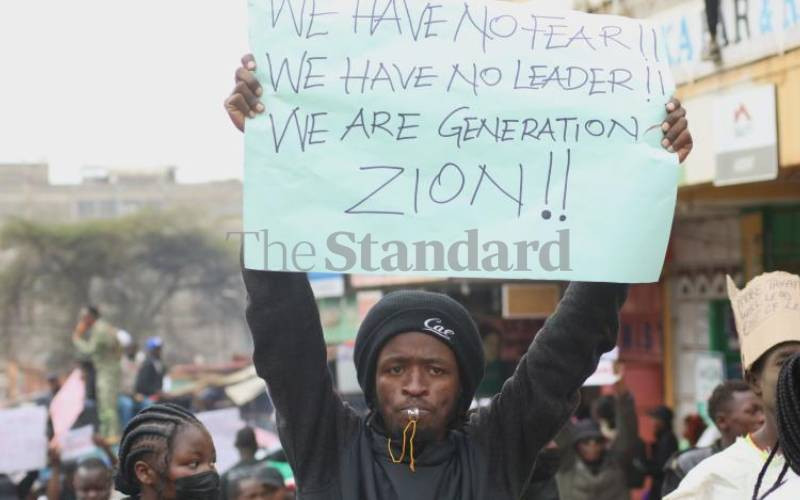By MAORE ITHULA
After doing well in last year’s KCPE, Moses Muria joined a national school. His parents were elated. However, when schools closed last week, Muria took home a new trait.
When Muria received an old friend, John, who had also joined a national school, the lads saluted each other not by handshake, as is the norm, but by fist bump, known more commonly as gota.
Muria’s mother, Mary Njeri, was exasperated. Her worry stemmed from the teachings of her pastor. He says fist-bumps are the telltale signs of youngsters abusing drugs and other substances.
The clenched fist greeting is common among youths, especially in the urban areas.
The fist bump salutation is also referred to as the fist pound, power five, knuckle bump, or simply the dap. It is a gesture similar in meaning to a handshake or high five.
Various communities have different regard for gota. For instance, when a youngster among the Gikuyu community greets an older person, the latter grudgingly acknowledges the salutation but not without an unpalatable comment.
Ironically, this kind of salutation is described by a public health expert as the most hygienic greeting.
Communicable diseases
Gervase Miriti, Nairobi’s Provincial Disease Surveillance Coordinator says he does not know a better way of keeping away communicable diseases other than the fist bump greeting, especially in a country that does not meet the water needs for most of its populace.
"Contrary to the negative reception it has attracted from the older generation, the State and other leaders, especially politicians and the clergy, they should popularise this form of greeting because it is cleaner and more hygienic than the traditional handshake," says Miriti.
He continues: "Kenya has a problem meeting water needs for her people. In this case, it would be good if we popularised the fist bump greeting to avoid spreading germs through handshakes."
Furthermore, Miriti says even the handshake is not really African, as seen among some communities in the country.
"Among the Maasai and Kalenjin communities older people do not shake hands with children, perhaps to safeguard the latter from contracting diseases from the former.
Instead, children bow their heads for the older people to tap them lightly in greeting. Among the Luo community, it is a taboo for a woman to shake hands with a son-in-law. In the olden days, greetings among the Ameru was just verbal. No body contact was made even when someone had been away for a long time," Miriti elaborates.
Stay informed. Subscribe to our newsletter
HAND-WASHING
But how unhygienic is the handshake? Miriti says hands are carriers of many pathogens, especially in a society where washing hands is minimum because water is scarce. And where water is available, soaps and detergents are not.
Some of the germs that may be transmitted through hands include those that cause cholera, typhoid and amoeba.
Although Miriti thinks public hand washing is improving, he says there are no sinks in many boardrooms, playgrounds or supermarkets where people shake hands most often.
Elsewhere, research has established that about half of Americans (49 per cent) have chosen the fist bump over the classic handshake for reasons that include fear of germs (15 per cent), sweaty palms (13 per cent) and dry hands (six per cent).
But Harun Baracha, a Nairobi sociologist has very kind words for the handshake.
"The handshake is very important in society. Indeed, it is more than a gesture greeting. In some instances it can mean "unofficial deal, you can count on me, or a host of other undocumented affirmations and agreements," he explains.
In Baracha’s view, before the age of corporate litigators, a handshake was the official dealmaker and deal closer.
RASTAFARIANS
Magambi Baikwinga, a human resource expert in the city agrees with Baracha.
Baikwinga says the traditional handshake is very important for jobseekers and human resource experts. A firm handshake, says he, is an indication that a jobseeker is confident.
"A handshake need be firm but gentle. Too firm means you’re trying too hard. The handshake in my area of expertise gives the impression of weakness, disinterest and/or low self-esteem," Baikwinga explains.
The handshake has been a part of business since the dawn of commerce and is too entrenched to be replaced, says University of Iowa management professor Greg Stewart, who has done a study that confirmed that a firm handshake at a job interview is as helpful as a dead-fish handshake is detrimental. The study was published in the Journal of Applied Psychology two years ago.
So, for Muria and his cronies, gota may just be a fad that affirms peer identity, but one that also excites social debate.
Rastafarians also use the fist-bump salute, with the clenched fist signifying unity.
 The Standard Group Plc is a
multi-media organization with investments in media platforms spanning newspaper
print operations, television, radio broadcasting, digital and online services. The
Standard Group is recognized as a leading multi-media house in Kenya with a key
influence in matters of national and international interest.
The Standard Group Plc is a
multi-media organization with investments in media platforms spanning newspaper
print operations, television, radio broadcasting, digital and online services. The
Standard Group is recognized as a leading multi-media house in Kenya with a key
influence in matters of national and international interest.
 The Standard Group Plc is a
multi-media organization with investments in media platforms spanning newspaper
print operations, television, radio broadcasting, digital and online services. The
Standard Group is recognized as a leading multi-media house in Kenya with a key
influence in matters of national and international interest.
The Standard Group Plc is a
multi-media organization with investments in media platforms spanning newspaper
print operations, television, radio broadcasting, digital and online services. The
Standard Group is recognized as a leading multi-media house in Kenya with a key
influence in matters of national and international interest.





